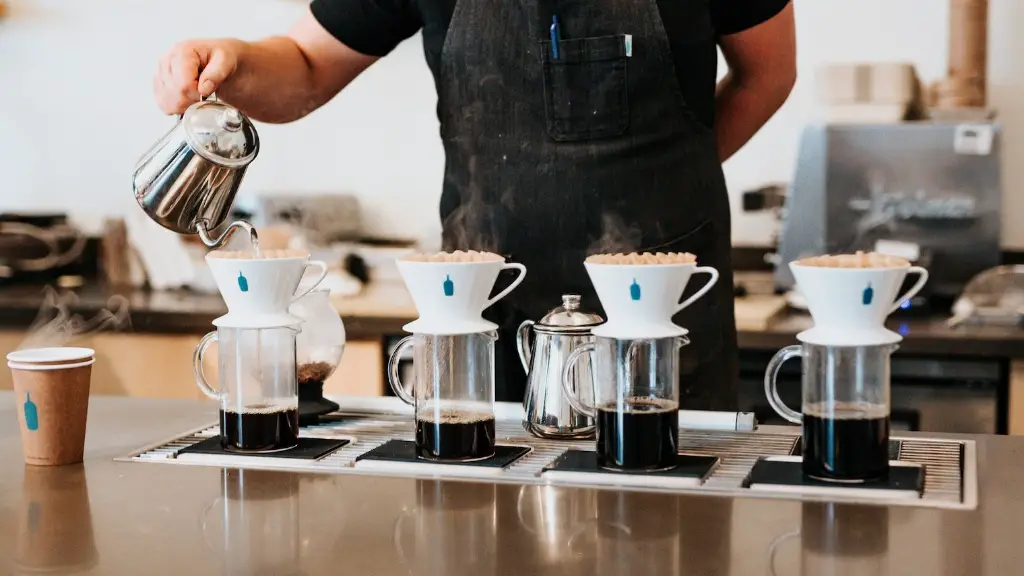Background of Coffee and Nausea
Coffee has been a popular beverage for many centuries, with nearly 2 billion cups of coffee consumed worldwide on a daily basis. Coffee can help individuals stay alert and energized throughout the day, but for some it can come with an unpleasant side effect – nausea. While the exact cause of nausea from coffee remains unknown, researchers have developed theories as to why this happens.
Physiological Reasons
The first and most obvious cause of nausea from coffee is simply due to its high caffeine content. Caffeine is known to increase alertness and energy levels, which can cause the body’s physiology to change. Caffeine can cause the heart rate to increase and the body’s metabolism to accelerate. These changes can cause nausea or a feeling of queasiness in some individuals. Additionally, the acidity of coffee can cause stomach upset and contribute to feelings of nausea.
Psychological Causes
In addition to physical side effects, the psychological effects of coffee can also trigger nausea. According to research, the stress and anxiety that often accompanies the consumption of coffee can cause feelings of nausea. In some cases, the mere anticipation of drinking coffee can lead to feelings of nausea.
Prevention and Treatment
If you experience nausea after drinking coffee, there are steps you can take to prevent it. Firstly, limiting your caffeine intake and drinking smaller cups of coffee can help reduce the effects of nausea. Additionally, drinking plenty of water and eating a balanced diet can help nourish your body and reduce feelings of nausea. In more extreme cases, anti-nausea medications may be necessary.
Effects on Health
Another important factor to consider when it comes to nausea from coffee are its long-term effects on health. Prolonged consumption of coffee can cause an increase in heart rate and blood pressure, which can lead to more serious medical issues. Additionally, it is important to be aware of the addictive properties of caffeine-containing products and the potential for dependency and withdrawal symptoms.
Alternative Drinks
If you find that coffee is causing you nausea, then it might be beneficial to find alternative drinks to get your caffeine kick. There are a number of alternatives available, including tea, energy drinks, and soda. These drinks contain varying levels of caffeine and can be helpful in getting an energy boost without the unpleasant side effects.
Caffeine Sensitivity
Lastly, it is important to understand caffeine sensitivity and how it can affect your body. Some individuals may be more sensitive to the effects of caffeine and other stimulants and may experience more intense side effects. It is important to assess your personal caffeine sensitivity and make adjustments to your coffee intake accordingly.
Social Implications
It is also important to consider the social implications of nausea from coffee. For those who often drink coffee with friends or colleagues, nausea can be embarrassing and can lead to uncomfortable situations. It is important to understand your body, recognize when you are feeling nauseous, and make necessary adjustments before drinking coffee in social settings.
Cupping Coffee to Minimize Nausea
One way to minimize the effects of nausea from coffee is to practice cupping. This involves tasting small amounts of brewed coffee and assessing the flavor profiles, aroma, and body. Practicing the art of cupping can help you gain a better understanding of coffee and develop a better appreciation for the beverage.
The Art of Roasting
Another way to reduce the effects of nausea from coffee is to practice the art of roasting. Coffee is best enjoyed when it is freshly roasted and ground, and this can be done onsmall-scale home appliances. Roasting coffee at home can help to reduce nausea from coffee by allowing you to customize the coffee to your taste and to your liking.
Using Your Senses to Select Coffee
Using your senses can also be helpful when selecting coffee to help minimize the effects of nausea. Carefully examining the coffee, the grind size, and the brewing method can help you identify any potential issues and make an informed decision when selecting coffee. Additionally, using a coffee grinder to freshly grind your coffee can help to ensure that you are getting the most out of the beans and reducing any potential nausea caused by preground coffee.
Pairing Coffee with Other Foods
Finally, pairing your coffee with other foods can help reduce the effects of nausea. Eating foods high in fat before consuming coffee can help to reduce the stomach acidity and absorb the caffeine better. Additionally, eating healthy snacks such as nuts or fruits can provide you with additional nutrients and minerals to help combat the effects of nausea.



